- Home
- Robert Fulghum
Maybe (Maybe Not)
Maybe (Maybe Not) Read online
“ZESTY ENTERTAINMENT …
The author’s missionary spirit glows even brighter in his fourth book than in its bestselling predecessors.”
—Publishers Weekly
“Anything is possible if you have the courage to try to make it happen. With his gentle humor and universal message, Fulghum may even inspire readers who don’t usually go looking for inspiration.”
—People
“Comfortable without being bucolic, wise without preaching, simple without triteness…So what are these books about? They are just about anything that has resonance.”
—Los Angeles Daily News
“Fulghum thinks about the little things: sun-brewed tea, poinsettias, navels, and what we write in those little blanks on official forms.… Sometimes wise and often witty, Fulghum has a nifty knack for saying things you want to copy out and tack up on your bulletin board.”
—The Cleveland Plain Dealer
“Mix Kurt Vonnegut Jr. with Paul Harvey and you get Robert Fulghum: Vonnegut for his punchy, repetitive, ironic style and Harvey for his parables of ordinary life. Fulghum here meditates on ambivalence.… [He] lifts this kind of story into the realm of rapture.”
—Booklist
“Witty, inspiring, entertaining, enlightening…Don’t be surprised to find your secret life among the pages of Maybe (Maybe Not). And be prepared to laugh at yourself, because Fulghum reveals little without a good dose of humor.”
—Tulsa World
“Fulghum maps out a back- to basics course on what life was meant to be. His humorous yet prophetic stories have a sense of warmth and reality minus the plastic phoniness of today’s materialistic world. It’s refreshing to pick up a book, read it, and find yourself laughing with enjoyment.… Maybe (Maybe Not) is worth reading because it focuses on the strength of the human spirit and the individual’s need for meaning.”
—Greensboro News & Record
“A GREAT DEAL OF GENTLE WISDOM
AND HUMOR …
Maybe (Maybe Not) deserves a place on your bedside table.”
—Nashville Banner
“Stop and smell the roses. Be yourself. Have dreams.… Fulghum serves up another cup of cheer.… There are some sections that may touch your heart.”
—The Virginian-Pilot & The Ledger-Star
“Sometimes while reading his reflections on life, his humor made me laugh out loud. Sometimes I felt moved by the depth of his emotion.”
—Albuquerque Journal
“Refreshing.”
—The Cincinnati Post
“What Fulghum does, with amusing and heartwarming anecdotes from his own life, is remind us of everyday truths. It’s commonsense stuff, and there’s certainly nothing wrong with that.”
—The Indianapolis Star
“The revelations of learning to iron a shirt, listening to his elders swap tales at the barbershop, contemplating the circumstances of one’s own conception, and other musings reveal a glimpse of a simpler life where, maybe, we can slow down and enjoy the fullness of life as it’s meant to be.”
—The Charleston Post & Courier
“Light, charming, page-turning fare, with plenty to be read aloud and recalled with pleasure.”
—The Anniston Star
“Fulghum writes about what goes on behind the closed door of the secret side of our minds.… [He] is always a pleasure to read.… Some readers may want to use lightly penciled marginal notes to help them return quickly to particular favorites.”
—Austin American-Statesman
BOOKS BY ROBERT FULGHUM
All I Really Need to Know I Learned in Kindergarten
It Was on Fire When I Lay Down on It
Uh-Oh:
Some Observations from Both Sides of the Refrigerator Door
Maybe (Maybe Not):
Second Thoughts from a Secret Life
From Beginning to End:
The Rituals of Our Lives
A Fawcett Columbine Book
Published by Ballantine Books
Copyright © 1993 by Robert Fulghum
All rights reserved under International and Pan-American Copyright Conventions. Published in the United States by Ballantine Books, a division of Random House, Inc., New York, and simultaneously in Canada by Random House of Canada Limited, Toronto.
http://www.randomhouse.com
Library of Congress Catalog Card Number: 97-90331
eISBN: 978-0-307-77598-6
This edition published by arrangement with Villard Books, a division of Random House, Inc. Villard Books is a registered trademark of Random House, Inc.
v3.1
Contents
Cover
Other Books by This Author
Title Page
Copyright
First Page
About the Author
A rabbi and I once engaged in a friendly intellectual hockey match trying to choose a single word to summarize human wisdom. He submitted a Hebrew term—timshel. It’s found in the oldest story in our common literature—in Genesis—the book of beginnings.
After being expelled from the Garden of Eden, Adam and Eve had two sons. The elder was called Cain. He was the first man born outside of paradise.
In time Cain grew up and cultivated his land and brought the first fruits as an offering to God. The offering was rejected. Jehovah explained to Cain that he was tangled up with evil—it lurked around his door. “But,” Jehovah said, “you may triumph over evil and have abundant life.”
That’s a crucial sentence—the last thing Jehovah says to Cain.
“You may triumph over evil and have abundant life.”
The critical word is the second one, the verb—may.
Timshel in Hebrew.
This term has vexed scholars and theologians for a long time. It sits in the middle of a passage considered one of the five most difficult in the Scriptures to translate and understand. In context it has varied meanings, especially in this interchange between Jehovah and Cain.
Timshel has been interpreted to mean “you shall”—that’s an order, a command. Timshel has been interpreted to mean “you will”—which implies predestination. Timshel has even been interpreted to mean “you cannot,” which suggests hopeless dependence. All these interpretations define a relationship with God that leaves little freedom.
My friend the rabbi feels that the practical meaning of that passage of Scripture concerns vitality—meaning “Don’t be dead,” or “Don’t be a passive victim—be active—be alive.” He reads it as good advice: There is this problem with evil—you really should deal with it.
Carry that one step further—if you should, then you may.
To interpret timshel to mean “you may” is to use a word that implies the possibility of choice. This is not a matter of theological hairsplitting. I think a strong case can be made that human beings have at least acted as if “you may” was the correct interpretation—acting as if our destiny is in our hands.
Whatever we may think or believe, what we have done is our story.
You don’t need to be a theologian or belong to any particular religious group to enter this discussion, but you do come down somewhere on this issue of what’s possible in your life by how you in fact go about your life. You live this truth, one way or another.
In modern English, timshel means “it may be,” or, simply, “maybe.”
Maybe. There’s our word.
The wisest answer to ultimate questions.
A word pointing at open doors and wide horizons.
I do not believe that the meaning of life is a puzzle to be solved.
Life is. I am. Anything might happen.
And I believe I may invest my life with meaning.
The uncertainty i
s a blessing in disguise.
If I were absolutely certain about all things, I would spend my life in anxious misery, fearful of losing my way. But since everything and anything are always possible, the miraculous is always nearby and wonders shall never, ever cease.
I believe that human freedom may be stated in one term, which serves as a little brick propping open the door of existence: Maybe.
Suppose that everything going on in your head in twenty-four hours could be accurately recorded on videotape. Your night dreams and daytime fantasies, conversations with yourself and appeals to the gods, the music and memories that float about, and all the loony trivia that ricochets around in your mind.
Suppose all this material could be played in a theater—with multiple screens and a multitrack sound system. A pretty sensational show, I’d guess. MTV, X-rated video, Science Fiction Theater, Harlequin Romances, CD-ROM, and the National Enquirer combined couldn’t compete with what goes on behind the closed door of the secret side of our minds.
The operative word here is “secret.”
Public lives are lived out on the job and in the marketplace, where certain rules, conventions, laws, and social customs keep most of us in line.
Private lives are lived out in the presence of family, friends, and neighbors who must be considered and respected, even though the rules and proscriptions are looser than what’s allowed in public.
But in our secret lives, inside our own heads, almost anything goes.
We alone are answerable for what we think and do when nobody else is around or involved. Categories of “fact” and “fiction” are irrelevant in here. Are dreams true? Is what you imagine accurate?
Inside these tight boundaries of flesh and bone is a borderless jungle in which clearings exist. In these open spaces, there may be an amusement park, a zoo, a circus, a library, a museum, a theater, or a landscape stranger than Mars.
We refer to ourselves in first person singular—“I”—but inside, it’s more like first person plural. Most of the time, my inner life seems like a ventriloquist act. A ceaseless dialogue between Me and my dummy. Oddly enough, the dummy is smarter than I am.
It seems as if my dummy and I have lots of company. There’s quite a crowd in here with us. A child and its parents. A wise old person. A mechanic, demons, a fool, a scientist, comedian, musician, dancer, athlete, magician, professor; a Romeo, censor, police officer, fire fighter, and multitudes more. The population of a small town inhabits the landscape of these disunited states of myself. And the town meeting is always in session.
I can fully relate to the occasional stories in the tabloids about multiple personalities. This is not news to me. In the best sense of the word, I run an asylum—a safe refuge—in my mind. And it’s not a problem. As long as I keep the shades drawn and the doors closed, and don’t let anybody loose, all is well. As long as I’m firmly in charge of my secret life, the world sees me as sane and functional. Am I? Sometimes it’s hard to tell.
Those who have closely considered the secret life—people like Freud and Jung—use metaphors to speak about the way we keep the secret life from causing chaos in personal and public life. They speak of “the gatekeeper,” “superego,” “monitor,” and “inner parent.”
My own metaphor is the Committee.
And my ventriloquist’s dummy seems to be the chairman.
I think of my committee as odds makers who say things like, “If you rob a bank, it’s ten to one that the FBI will get you, and you will end up in jail for a long time.” Or, “If you tell people you talk to God, they’ll think you’re religious, but if you say God talks to you, it’s ten to one they’ll think you’re crazy.”
Most of the time, most of us go around with our heads running full tilt doing the most amazing things, while we safely negotiate the obligations of public and private life. Much of what goes on in the secret life is not aberrational. Sometimes entertaining, it is often mundane and unexceptional—neither dramatic nor demonic. Just the necessary backstage maintenance operation of life where we sort out the contradictory material into piles of what works and what doesn’t, what’s useful and what’s not.
The French have a charming term for one aspect of the secret life.
La perruque. It means “the wig,” and is slang for a particular kind of disguise. It refers to what you do for yourself while apparently going about the job you are paid to do. If you are a typist working at your desk and you are in fact writing a letter to your lover on company time, this is la perruque. When you make personal calls from your office phone, do a little grocery shopping while out on company business, daydream, or even use your employer’s time to make a list of things to do over the weekend, it’s all la perruque—conducting your personal life under the guise of working at your job. It’s not stealing. It’s an acknowledgment that your public life, personal life, and secret life run concurrently and parallel. La perruque on the job is balanced by the time you think about work while you are on vacation.
The workings of a family include the secret life.
My oldest son is a man now. Thirty-two, grown-up. He knows about money, sex, love, work—success and failure. We have become peers in many ways.
We went out for a beer together recently, and he confessed to me things he thought and did behind my back when he was a kid. Then I confessed to him things I knew he was thinking and doing but didn’t do anything about because I couldn’t deal with them, having done the same or worse when I was his age. While playing the public role of parent, I was still secretly both a rebellious adolescent and a fearful child. La perruque—always the disguises.
Or consider this family secret.
The father of a friend died suddenly at eighty-two. My friend was an only child, himself divorced, and his own children lived too far away to come to the funeral. A lonely time.
The father was a solemn, humorless, literal-minded man who had been a mechanical engineer all his life. Not much imagination or affection. My friend respected his father, but the relationship was a formal and somewhat distant one. But now his father was dead, and the son was the sole heir to the estate.
The government thinks of an estate as money, stocks, bonds, life insurance, jewelry, and any other tangible item of value that can be assessed and taxed. But there is always all the other stuff—all the small things—the knickknacks—the odds and ends of a life. These are kept, sometimes hidden, in places where you would not ever trespass when your parents were alive. But now you must look. And make decisions about what to keep and what to dispose of. You are licensed by death to enter the antechamber of your parents’ secret life.
There is usually a drawer. Top drawer. In a bureau in the bedroom.
In this case, the father was an orderly man. At one end of his top drawer were all his socks, folded and sorted by color—black and brown. In the other end, several small boxes and a tobacco tin.
In one little box, his U.S. Air Force insignia pins from his uniform and cap. In another, miscellaneous jewelry—tie tacks, collar stays, studs, some foreign coins, and three keys. The old man kept his deceased wife’s wedding ring in the original box from the jewelers, along with a lock of her red hair.
And in a flat cigar tin, wrapped in tissue paper, there were tiny teeth neatly glued to a card, with a date under each one in the father’s handwriting. Human teeth.
This find was a bit of a shock.
His father was the tooth fairy.
All these years he’d thought it was his mom.
Not all the family secrets are bad news.
When my grown children confess what they did behind my back when they were kids, it doesn’t occur to them that I was also doing a few things behind their backs. In the spirit of fairness to my wife and children, I confess:
I used the wok once to change the oil in the car.
And I used the sewing scissors to cut canvas.
I used the kitchen-sink sponge to clean my shoes.
Sometimes I said the coffee I made was dec
af when it wasn’t.
Yes, it was me who ate the baking chocolate.
The hamsters didn’t die from old age.
I deliberately left price tags on presents sometimes. Even raised them.
I always took a private cut of the money Grandmother sent for Christmas.
I lied when I said you looked beautiful when you were a teenager.
When I did the cooking, what I said wasn’t leftovers often was.
The Playboy subscription that came for years was not a gift from a friend.
Remember when all the old white underwear got stained pink in the wash? It wasn’t an accident.
I know who sent you anonymous cards for Valentine’s Day.
I know who took money out of my wallet.
But I know you know who took money out of the piggy banks.
At times I said I missed you when, in fact, I was glad to be alone for a while.
I always said I was proud of you—even when I knew you could do better.
I let you lie to me sometimes because the truth was too hard for all of us.
Sometimes I said “I love you” when I didn’t love anyone, not even me.
Your mother and I both played Santa Claus on Christmas Eve.
But I was always the Easter Bunny.
At the end of January, at the end of my desk, sits a potted poinsetta.
Yes, I know that the correct spelling and pronunciation are “poinsettia.”
I don’t care.
And I am trying hard not to care about this particular plant.
For my role in its life is that of executioner.
Every year in December for as long as I can remember, at least one potted poinsetta has appeared in my life. I never buy one. Someone always gives me one. Unlike other seasonal gift flowers—lilies, daffodils, carnations, and such—poinsettas do not just bring their message and then die and leave your life in a graceful way. They have a life span comparable to a sea turtle, and are as tenacious as cacti. Even if neglected, they will hang on and on and on. Encouraged, they can become bushes sixteen feet high.

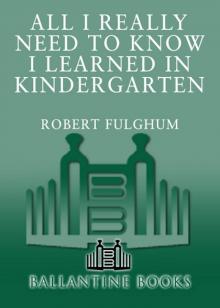 All I Really Need to Know I Learned in Kindergarten
All I Really Need to Know I Learned in Kindergarten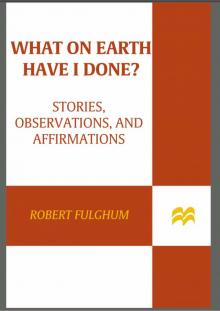 What On Earth Have I Done?
What On Earth Have I Done?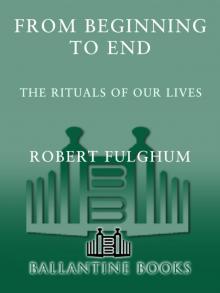 From Beginning to End
From Beginning to End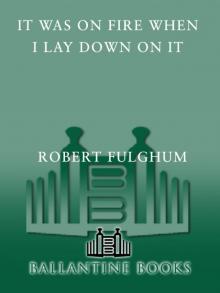 It Was On Fire When I Lay Down On It
It Was On Fire When I Lay Down On It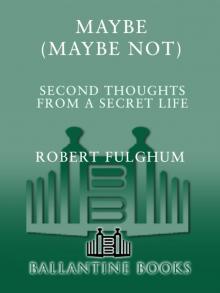 Maybe (Maybe Not)
Maybe (Maybe Not)